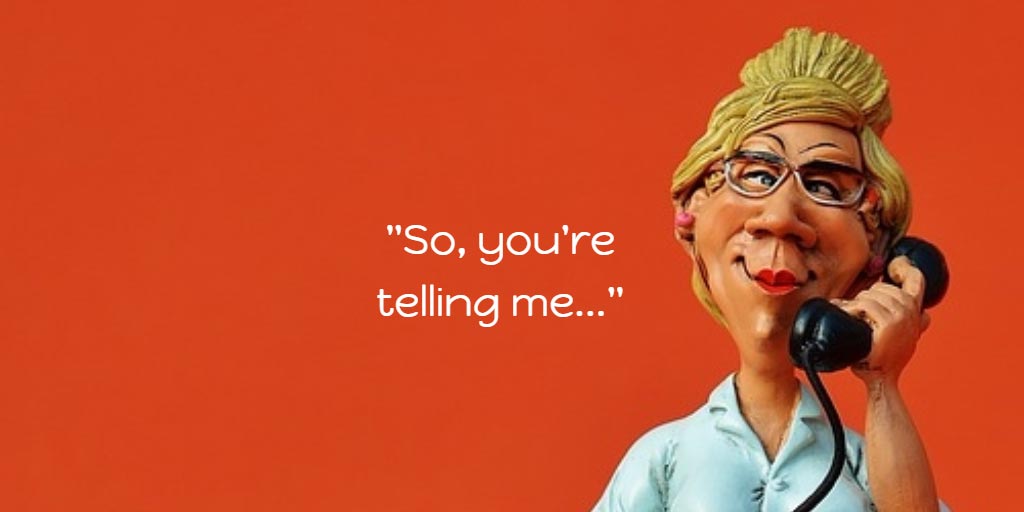esterday, I was on the phone with a company that’s been giving me the run around for way too long. Normally, I’d have taken my business elsewhere. But, because it’s my father-in-law’s health insurance, and part of his pension, I was locked in.
For years, I’ve been facing terrible customer service from this company. Multiple customer service “pros” have been failing to meet their company’s obligations. Finally, during yesterday’s call, I found myself speaking with a supervisor who knew how customer service was done. Carrie (the supervisor) was guaranteeing me this, and apologizing for that. She empathized with me about the long-standing problems I’d been having. She called the experience I’d had so far, “unacceptable.”
Things on the call with her were going well until I asked to be refunded for $40 of prescriptions I’d had to pay out-of-pocket because of her company’s failures. “I don’t have the receipt,” I admitted. Carrie was happy to offer a refund, but understandably needed the receipt to do so. Accounting will be accounting.
And then she said what no person in customer service should ever say.
“There’s nothing I can do.”
If I’m your customer, “There’s nothing I can do,” is the absolute last thing I want to hear from you. I’m looking to you for service. Don’t balk. Find a way to serve. Maybe you don’t have the authority to do what I’m asking. Maybe you have the authority, but not the willingness. Either way, if you determine that there’s something you can do to help, if you only find it, you will find a way. Offer what you do have.
On the call I was describing, I momentarily felt my hopes — finally rekindled by the first responsible and reasonable professional I’d reached after a year’s struggle — dashed by the simple statement, “There’s nothing I can do.”
But, I considered what I’d come to know about Carrie in the past five minutes of excellent customer service. I reached down deep and gathered what was left of my trust, and said, “Carrie.” (I’ve changed her name.) “Carrie, please don’t say that. After the experience I’ve had with your company, I don’t want you to say that there’s nothing you can do.”
She said, “I wish there was. You haven’t been getting the service you deserve. I’d like to give you a refund. I really would. But I’d need a receipt.”
“Thank you, Carrie,” I said. “Here’s what you can offer. I spend $10 with you every month on medications. You can take my word that the refund would be about $40, and you can offer me a credit for the next four months of purchases. You wouldn’t need a receipt to offer me that. Heck, you could offer me that credit simply for the inconvenience and hassle your company has been putting me through on a regular basis for years.”
“We could do that,” she said. She sounded relieved. I’d broken the fear that had caused her to balk. “I’ll credit your account $40.”
It’s Not True. It Degrades Trust.
Guess what. When you say, “There’s nothing I can do,” no one ever believes you. It’s the refuge of the frightened, the lazy, and the powerless.
When you or someone on your team says, “There’s nothing I can do,” your customer’s hopes are crushed, and they start to wish they’d never engaged with your company.
Whatever the reason you’re telling your customer, “I can’t help,” you’re shattering their trust and losing their respect.
Customer Service Alternatives
“I’m not going to do that,” preserves more trust and respect than, “I can’t.”
By saying, “I’m not going to,” you are naming a choice. I may not agree with that choice. I may not like it. But at least you’re being honest and courageous by giving it to me straight.
Better still, if you can’t or won’t do what your customer is asking, then ask yourself, “What can I do? What will I do?”
- I can’t give you a refund, but I will give you credit.
- I can ask my supervisor.
- I don’t know the answer to that question, but I will investigate and call you within the hour to give you the answer.
Happy Side Effect
So, a practice of finding what you CAN do when you can’t or won’t do what a customer (or a colleague) is asking vastly improves customer experience. It can make the difference between losing a client and wowing a client.
It also improves employee experience and employee engagement. None of us likes feeling powerless. When we say we’re powerless, we feel powerless. Look for the power you have, find creative solutions, and you’ll feel powerful.
HEY, POLICY MAKERS!
Meanwhile, employers, give your employees all the authority they need to satisfy the majority of customer complaints. Your customers will be happy. Your employees will be happy, and engaged, and will stay on the job. And you’ll find you’re swimming in loyalty from both customers and employees.
_______________
Imagine your team operating with high-level EQ. Trouble is, reading an article doesn’t reliably change behavior. That’s why we created Adeptability Training for your team for a high-performance accountability culture that’s fun and fulfilling to work in. Want an Adeptable team?

